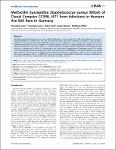Methicillin Susceptible Staphylococcus aureus (MSSA) of Clonal Complex CC398, t571 from Infections in Humans Are Still Rare in Germany
Cuny, Christiane
Layer, Franziska
Köck, Robin
Werner, Guido
Witte, Wolfgang
Methicillin-susceptible Staphylococcus aureus (MSSA) attributed to clonal complex (CC) 398 and exhibiting spa-type t571 received attention in Europe and in the USA for being associated with severe infections in humans. As this spa-type is exhibited by livestock-associated (LA) Methicillin-resistant S. aureus (MRSA) as well, it is important to discriminate LA- and human-derived strains by easy to perform, PCR-based methods. MSSA t571 contain phage int3 carrying scn and chp, whereas LA-MRSA t571 lack these markers. In contrast, pathogenicity island SaPIbov5 (detected by PCR bridging vwbbov and scn) is contained by LA-MRSA t571 and absent in the human MSSA subpopulation. Furthermore, MSSA t571 contain erm(T), the particular genomic arrangement of which was assessed by a PCR bridging erm(T) and the adjacent transposase gene. MSSA t571 are rare so far in Germany among isolates from infections in humans (0.14%) as well as among isolates from nasal colonization (0.13%). LA-MRSA t571 are also infrequent among MRSA isolated from carriage at admission to hospitals (0.1%) and also among isolates from infections in humans (0.013%).
No license information

